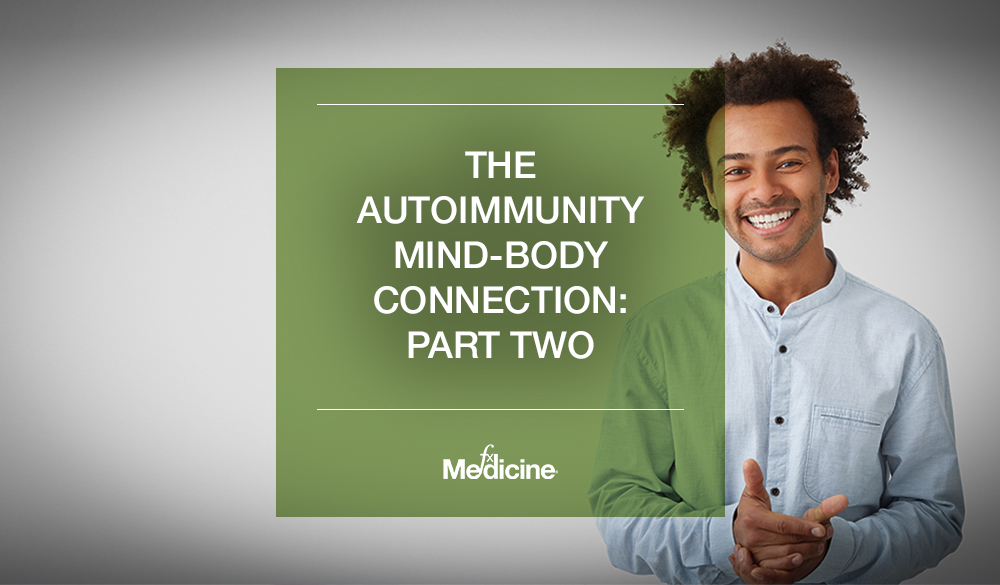This article was originally published by Dr Datis Kharrazian on drknews.com
So how exactly do happiness, positivity, and socialization improve health? They profoundly influence stress levels, inflammation, and the release of feel-good chemicals, all of which play roles in autoimmune management. Social isolation, pessimistic thinking, toxic relationships, unhappy marriages, dead-end jobs, living a life without meaning or purpose — all these factors raise stress, perpetuate immune imbalances, and foster chronic disease.
For instance, brain autopsies of individuals who felt they had purpose in their lives showed they had all the markers of Alzheimer’s. Yet these individuals lived free of dementia thanks to the cognitive benefits of a meaningful life. This illustrates the powerful influence of positivity on brain health.[1-6] Another study of law students found that optimism improved their immune response while pessimism worsened it. Optimism was also linked with better grades and more job offers.[7]
Along the same lines, regular healthy touch, whether from loved ones or through bodywork, has also been shown to keep the immune system healthy and promote good cardiovascular health. This is one of the reasons massage therapy helps people unwind—it lowers cortisol, slows the heart rate, and lowers blood pressure, all of which allow the immune system to operate more efficiently. Massages and healthy touch also lower stress hormones and increase oxytocin, a “bliss” hormone that can help balance the immune system.[8]
You may have also heard laughter is good medicine. This is because it creates positive emotions and helps you connect with others—we’re 30 times more likely to laugh when we’re with others than when alone. In fact, a fascinating 2017 study showed that watching a live performance synchronizes your heart rate with the other members in the audience.9 Although it has not been studied much, laughter has been shown to improve immunity, decrease stress, help regulate blood sugar, alleviate depression and anxiety, increase pain tolerance, and improve your sense of well-being.[10-15]
Play isn’t just for children and is another way to develop a positivity habit for better health. Wildlife research shows that all intelligent species of animals play throughout adulthood, except, perhaps, for many human adults. Like laughter, play reduces stress and helps form social bonds. It also provides healthy stimulation for the brain and helps create happiness and positivity.[16]
Play is something many of us have to learn again. Think back to when you were a child and what you enjoyed and see if you can take up something like that again (as long as it’s safe for your physical abilities). Play is purposeless and fun—if it becomes about winning or beating times it may become another source of work instead. Ideas include playing fetch with your dog, roller skating, swimming, jumping on a trampoline, recreational swimming, playing a sport for fun, or some other physical activity that gives you a sense of exuberance and abandon.

Using the placebo effect to your benefit
The health benefits of positivity also help explain the placebo effect, when a sham treatment in a scientific study produces desired results. The placebo effect has long been the bane of researchers and drug companies, and the source of scorn. But why dismiss it if you can put it to work for you? Fortunately, some researchers have studied what causes the placebo effect and why it works. Although it’s not always predictable, we know enough to extract some value from it.
The placebo effect seems to work best when a person’s beliefs and expectations about a treatment are positive. For instance, in one study, participants’ pain dropped when they were told they received more of a pain-relief drug then they actually did. Their pain then rose considerably when they were told the medication had been stopped, even though it hadn’t. MRI scans showed the expectation of pain activated the pain networks in the brain.[17] This is an example of the opposite of the placebo effect—the noceboeffect. In the nocebo effect a negative belief causes a negative outcome.
In other words, your treatment or protocol has a much higher chance of being effective if you believe in it. Likewise, if you don’t think anything will work for you, you impact the chances of success. This is partly due, again, to the effect of a positive attitude on stress and inflammation.
I take patient belief systems very seriously in my practice, which is why I’m so driven to explain their condition to them and help get their partners or families on board. When patients understand what is going on and why they’re being asked to follow certain steps, it’s much easier for them to create a positive belief system. The knowledge and belief become a beneficial part of their protocol. In pains me when patients walk in with supplements from other practitioners and they have no idea what they are taking or why. It is very difficult to create a positive belief system when your protocol is a mystery.
Supporting positivity with supplements
Obviously, drugs and supplements still cause physiological effects and changes that benefit us regardless of our belief system. Herbs have been used medicinally since the beginning of humankind, and sometimes we can use them and other nutritional compounds to facilitate a more positive attitude.
For example, we have brain chemicals, or neurotransmitters, that profoundly influence how positive or negative we feel. Sometimes it is appropriate to begin a patient’s protocol with neurotransmitter support to restore some of the natural optimism or motivation she once had. Examples include using 5-HTP to boost serotonin activity. Serotonin is the neurotransmitter most associated with depression when it becomes low. Another example is using L-dopa or tyrosine to boost dopamine levels to enhance motivation and feelings of self-worth. If a patient with low dopamine comes in I will address that first because otherwise they are unlikely to follow through with their protocol. Theanine supports GABA and can take the edge off anxiety. These are a few little tricks to support you in your positivity practice.
These are just a few examples of the ways in which you can develop and express a more positive attitude and lifestyle, which will in turn foster a neurochemical environment in your body to dampen autoimmunity. Remember, you don’t have to become happy overnight or during a difficult time in life to experience the benefits of positivity. If something sad or negative happens in your life, it is appropriate to experience and process the negative emotions that come up around that. Suppressing them because you want to “stay positive,” also known as spiritual bypassingin some circles, can mask and prolong unresolved pain versus accepting them. However, practicing a positivity habit just a few minutes a day can feed into your overall strategy for managing autoimmunity and health.
Don’t blame your beliefs when illness happens or recovery doesn’t
Although positive thinking can be an effective functional medicine tool, please don’t use it as a sole indicator of health outcomes. Although our beliefs and attitudes influence our physiology, people don’t necessarily develop health problems because of their thinking. We all know stories of positive, happy, healthy people and, worse, children succumbing to terrible diseases. Or very negative, grumpy people who seem to live forever in good health. Also, we cannot use the notion of positive thinking to blame people when they don’t improve or recover. For example, one large cancer study found that a positive emotional status had no bearing on survival rates.[18] However, practicing positivity can help patients cope better.
Do not allow positivity to turn into sorcery or superstition, it is but one tool of many. Recovering is not a competition or an excuse to beat yourself up when things doesn’t go as planned. Although we can influence our general health through diet, lifestyle, and nutritional therapy, it’s folly to believe we control our health or our futures. There is so much we still don’t know about forces outside of and inside ourselves that we may never fully understand.
However, I hope that understanding the effects of your attitude and beliefs on your physiology gives you another strategy in your inflammatory and autoimmune management toolkit. If nothing else, perhaps it can make the journey through this life more meaningful.
Read Part I of The Autoimmunity Mind-Body Connection on drknews.com
References
-
Yang CY, McClintock MK, Kozloski M, et al. Social isolation and adult mortality: the role of chronic inflammation and sex differences. J Health Soc Behav 2013; 54(2):183–203. [Full text]
-
Roy B, Diez-Roux AV, Seeman T, et al. Association of optimism and pessimism with inflammation and hemostasis in the Multi-Ethnic Study of Atherosclerosis (MESA). Psychosom Med 2010;72(2):134-140. [Full text]
-
Miller GE, Rohleder N, Cole SW. Chronic interpersonal stress predicts activation of pro- and anti-inflammatory signaling pathways 6 months later. Psychosom Med 2009;71(1):57-62. [Full text]
-
Kim ES, Sun JK, Park N, et al. Purpose in life and reduced incidence of stroke in older adults: ‘The Health and Retirement Study’. J Psychosom Res 2013;74(5):427-432. [Abstract]
-
Boyle PA, Buchman AS, Wilson RS, et al. Effect of purpose in life on the relation between Alzheimer disease pathologic changes on cognitive function in advanced age. Arch Gen Psychiatry 2012;69(5):499-505. [Full text]
-
Tyas SL, Snowdon DA, Desrosiers MF, et al. Healthy ageing in the Nun Study: definition and neuropathologic correlates. Age and Ageing 2007;36(6):650-655. [Full text]
-
Optimism boosts the immune system. Association for Psychological Science. ScienceDaily 2010. [Source]
-
Trudeau M. Human connections start with with a friendly touch. NPR 2010. [Source]
-
Audience members’ hearts beat together at the theatre. University College London 2017. [Source]
-
Sakai Y, Takayanagi K, Ohno M, et al. A trial of improvement of immunity in cancer patients by laughter therapy. Jpn Hosp 2013;(32):53-59. [Abstract]
-
Seaward BL. Humor’s healing potential. Health Prog 1992;73(3):66-70. [Abstract]
-
Hayashi K, Hayashi T, Iwanaga S, et al. Laughter lowered the increase in postprandial blood glucose. Diabetes Care 2003;26(5):1651-1652. [Abstract]
-
Toda M, Ichikawa H. Effect of laughter on salivary flow rates and levels of chromogranin A in young adults and elderly people. Environ Health Prev Med 2012;17(6):494-499. [Full text]
-
Lebowitz KR, Suh S, Diaz PT, et al. Effects of humor and laughter on psychological functioning, quality of life, health status, and pulmonary functioning among patients with chronic obstructive pulmonary disease: a preliminary investigation. Heart Lung 2011;40(4):310-319. [Abstract]
-
Dunbar RI, Baron R, Frangou A, et al Social laughter is correlated with an elevated pain threshold. Proc Biol Sci 2012;279(1731):1161-1167. [Full text]
-
The National Institute for Play 2017. [Source]
-
Bingel U,Wanigasekera V, Wiech K, et al. The effect of treatment expectation on drug efficacy: imaging the analgesic benefit of the opioid Remifentanil. Sci Translational Med 2011;3(70):70ra14. [Abstract]
-
Coyne JC, Pajak TF, Harris J, et al. Emotional well‐being does not predict survival in head and neck cancer patients: a radiation therapy oncology group study. Cancer 2007;110(11). [Full text]
This article was originally published by Dr Datis Kharrazian on drknews.com
DISCLAIMER:
The information provided on FX Medicine is for educational and informational purposes only. The information provided on this site is not, nor is it intended to be, a substitute for professional advice or care. Please seek the advice of a qualified health care professional in the event something you have read here raises questions or concerns regarding your health.





